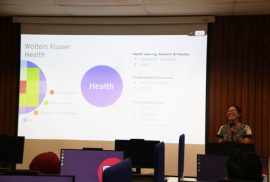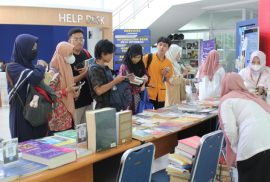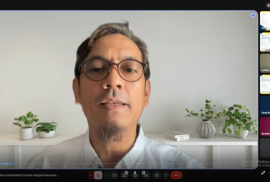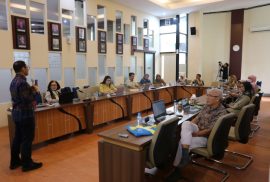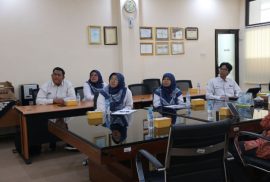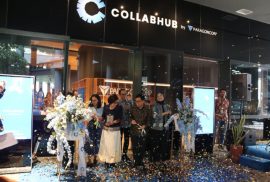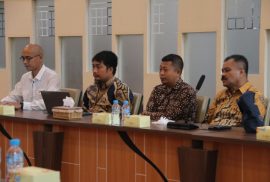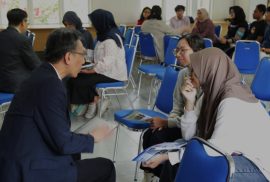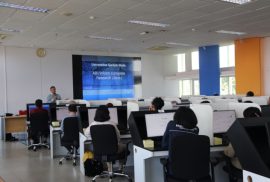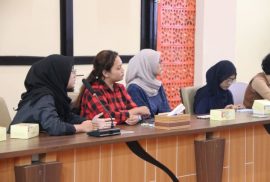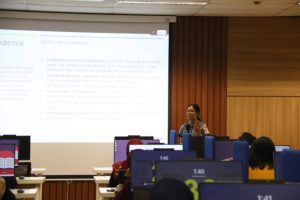 The Library and Archives of Universitas Gadjah Mada (UGM) organized a Webinar and Hands-on Session entitled Empowering Medical Knowledge Using LWW High Impact Collections – NEJM Bundles on Wednesday, 11/2/2026. The hybrid event took place at Room CBT C, 2nd Floor, FKKMK UGM Library, and was simultaneously attended online by members of the academic community. The program focused on strengthening participants’ understanding and skills in accessing and utilizing reputable medical journal collections to support learning, research, and evidence-based medical education.
The Library and Archives of Universitas Gadjah Mada (UGM) organized a Webinar and Hands-on Session entitled Empowering Medical Knowledge Using LWW High Impact Collections – NEJM Bundles on Wednesday, 11/2/2026. The hybrid event took place at Room CBT C, 2nd Floor, FKKMK UGM Library, and was simultaneously attended online by members of the academic community. The program focused on strengthening participants’ understanding and skills in accessing and utilizing reputable medical journal collections to support learning, research, and evidence-based medical education.
A warm spirit of literacy filled the lobby of the UGM Library and Archives on Wednesday–Thursday, February 11–12, 2026. Through the Rotate Your Book program, members of the UGM academic community were invited to exchange their own readable books for a selection of titles provided by the library.
Amid increasingly complex challenges to academic integrity—particularly with the widespread use of generative artificial intelligence—the Library and Archives of Universitas Gadjah Mada (UGM) has taken a strategic step by strengthening the role of Turnitin administrators and instructors as the frontline in plagiarism prevention. This effort was realized through the Workshop on Optimizing Turnitin as an Instrument for Plagiarism Prevention, held on Thursday, 12 February 2026.
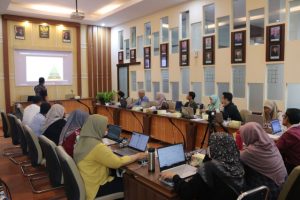 As part of its preparation for Scopus indexation, the Berkala Ilmu Perpustakaan dan Informasi (BIP) Journal, managed by Perpustakaan dan Arsip Universitas Gadjah Mada, organized an intensive workshop to strengthen scholarly journal governance. The initiative is part of a strategic effort to enhance the quality of journal management and reinforce the international competitiveness of UGM’s academic publications.
As part of its preparation for Scopus indexation, the Berkala Ilmu Perpustakaan dan Informasi (BIP) Journal, managed by Perpustakaan dan Arsip Universitas Gadjah Mada, organized an intensive workshop to strengthen scholarly journal governance. The initiative is part of a strategic effort to enhance the quality of journal management and reinforce the international competitiveness of UGM’s academic publications.
On Thursday (February 12, 2026), Perpustakaan dan Arsip Universitas Gadjah Mada (UGM) welcomed a study visit from the Library and Digital Service of Universitas Muhammadiyah Surakarta (UMS). This visit took place in Meeting Room L6 on the second floor. The activity focused on strengthening digital library service governance, specifically by integrating membership and circulation systems with academic systems, optimizing consultative services through the Library Clinic, and developing strategies for managing and evaluating collections to ensure they remain relevant to the academic needs of the community.
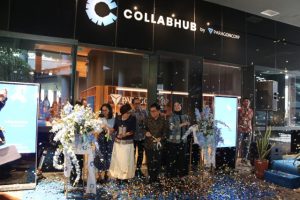 The Library and Archives of Universitas Gadjah Mada (UGM) supports the presence of a Mini Library at CollabHub by Paragon, located at the Gelanggang Inovasi dan Kreativitas UGM (GIK UGM). CollabHub by ParagonCorp was officially inaugurated on Wednesday (11/2/2026) as a collaborative and co-learning space for students.
The Library and Archives of Universitas Gadjah Mada (UGM) supports the presence of a Mini Library at CollabHub by Paragon, located at the Gelanggang Inovasi dan Kreativitas UGM (GIK UGM). CollabHub by ParagonCorp was officially inaugurated on Wednesday (11/2/2026) as a collaborative and co-learning space for students.
Perpustakaan dan Arsip Universitas Gadjah Mada (UGM) welcomed a study visit from the Library Technical Implementation Unit (UPA) of Universitas Tidar (Untidar) on Monday (February 9, 2026), held at the Archive Meeting Room, L7 Building, 2nd Floor. The visit focused on deepening understanding of digital scholarly reference governance, particularly the management of reputable international journal databases, from selection strategies to the evaluation of their use by the academic community.
The dream of pursuing higher education abroad is becoming increasingly attainable for students of Universitas Gadjah Mada (UGM). Through the Let’s Understand Better (LUB) program, the UGM Library and Archives, in collaboration with the Office of International Affairs (OIA) UGM, organized an Info Session on Studying at Tunghai University, Taiwan, bringing prospective students together with international academics in a direct and interactive forum.
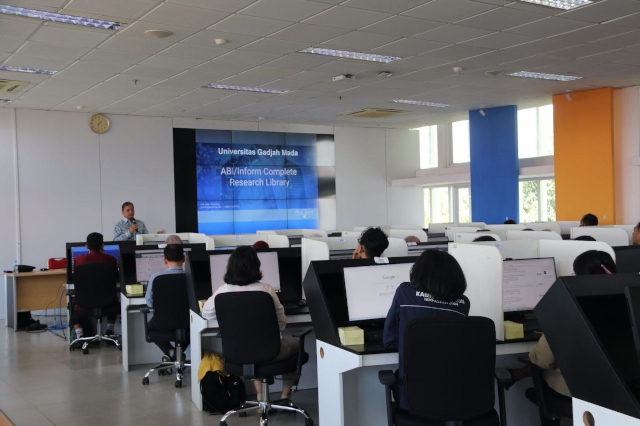 Access to reputable scholarly sources is key to producing high-quality research. Responding to this need, the Universitas Gadjah Mada (UGM) Library and Archives organized the ProQuest E-Journal Workshop as a Source for Research and Scholarly Writing to strengthen the academic community’s capacity to optimally utilize global academic databases.
Access to reputable scholarly sources is key to producing high-quality research. Responding to this need, the Universitas Gadjah Mada (UGM) Library and Archives organized the ProQuest E-Journal Workshop as a Source for Research and Scholarly Writing to strengthen the academic community’s capacity to optimally utilize global academic databases.
The Library and Archives of Universitas Gadjah Mada (UGM) reaffirm their commitment to developing professional and competitive young human resources through an orientation program for part-time student workers. This activity serves as an initial step before students are directly involved in supporting library and archival services at UGM.

